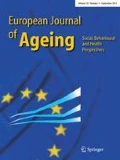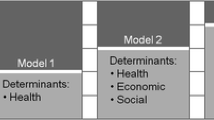Abstract
The objectives of this study are to detect the main components of global quality of life (QoL) of community-dwelling older adults from their own perspective and to identify determinants of health-related and global QoL in the same population. This is a cross-sectional study covering a representative sample of 1,106 community-dwelling adults aged 60 years and older residing in Spain. The survey collected information on QoL through a face-to-face interview asking for QoL components in free-format, as well as the completion of two QoL measures, the EQ-5D and the Personal Wellbeing Index. The most important QoL dimensions, according to the participants of this study, were health, family, and finances. Depression was the main determinant of both QoL indices, while functional independence and social support specifically influenced health-related and global QoL, respectively. Based on the perspective of the older adults as well as on statistical analysis, this work emphasizes the importance of health, family, and social support as areas of special interest in aging. There was a discrepancy when comparing findings related to the importance of financial status. Results also support that global and health-related QoL share some common determinants, but with different weights for functional independence and social support.
Similar content being viewed by others
References
Albrecht GL, Devlieger PJ (1999) The disability paradox: high quality of life against all odds. Soc Sci Med 48(8):977–988
Azpiazu Garrido M, Cruz Jentoft A, Villagrasa Ferrer JR, Abanades Herranz JC, García Marín N, Alvear de ValeroBernabé F (2002) Factores asociados a mal estado de salud percibido o a mala calidad de vida en personas mayores de 65 años [Factors associated with poor perceived health status or poor quality of life among persons aged over 65 years]. Rev Esp Salud Publica 76(6):683–699
Badía Llach X, Salamero M, Alonso J (2002) La medida de la salud. Guía de escalas de medición en español [The measure of health. A guide of measurement scales in Spanish]. Edimac (Fundación Lilly), Barcelona
Badía X, Roset M, Montserrat S, Herdman M, Segura A (1999) The Spanish version of the EuroQol: description and applications. Med Clin (Barc.) 112(Suppl 1):79–86
Baron-Epel O, Kaplan G (2001) General subjective health status or age-related subjective health status: does it make a difference? Soc Sci Med 53(10):1373–1381
Borglin G, Edberg A-K, Rahm Hallberg I (2005) The experience of quality of life among older people. J Aging Stud 19(2):201–220
Bowling A (1995) What things are important in people’s lives? A survey of the public’s judgments to inform scales of health related quality of life. Soc Sci Med 41(10):1447–1462
Bowling A (2005) Ageing well. Quality of life in old age. Open University Press, Berkshire
Bowling A, Zahava G (2004) An integrational model of quality of life in older age. Results from the ESRC/MRC HSRC quality of life survey in Britain. Soc Indic Res 69(1):1–36
Bowling A, Zahava G, Banister D, Sutton S (2001) Older people’s views on quality of life. Newsl Grow Older Progr (2):2
Broadhead W, Gehlbach S, De Gruy F, Kaplan B (1988) The Duke-UNC functional social support questionnaire. Measurement of social support in family medicine patients. Med Care 26:709–723
Brown J, Bowling A, Flynn T (2004) Models of quality of life: a taxonomy, overview and systematic review of the literature. European Forum on Population Ageing Research. http://www.shef.ac.uk/ageingresearch/pdf/qol_review_complete.pdf. Accessed 3 Feb 2012
Browne JP, O’Boyle CA, McGee HM, Joyce CRB, McDonald NJ, O’Malley K, Hiltbrunner B (1994) Individual quality of life in the healthy elderly. Qual Life Res 3(4):235–244
Cummins RA (1996) The domains of life satisfaction: an attempt to order chaos. Soc Indic Res 38(1):303–328
Cummins RA (2005) Moving from the quality of life concept to a theory. J Intellect Disabil Res 49(10):699–706
De la Revilla L, Bailón E, de Dios J, Delgado A, Prados M, Fleitas L (1991) Validación de una escala de apoyo social funcional para su uso en la consulta de médico de familia [Validation of a social and functional support scale for the family doctor consultation]. Aten Prim 8(9):688–692
Diener E (1994) Assessing subjective well-being: progress and opportunities. Soc Indic Res 31:103–157
Eriksson M, Lindström B (2005) Validity of Antonovsky’s sense of coherence scale: a systematic review. J Epidemiol Community Health 59(6):460
European Research Area in Ageing ERA-AGE (2010) http://www.era-age.group.shef.ac.uk/. Accessed 3 Feb 2012
Fernández Ballesteros R (2002) Social support and quality of life among older people in spain. J Soc Issues 58(4):645–659
Fernández Ballesteros R, Zamarrón MD, Maciá A (1996) Calidad de vida en la vejez en distintos contextos [quality of life in old age in different contexts]. Ministerio de Trabajo y Asuntos Sociales, Instituto Nacional de Servicios Sociales, Madrid
Fernandez-Mayoralas G, Rojo Pérez F (2005) Calidad de vida y salud: planteamientos conceptuales y métodos de investigación [Quality of life and health: Conceptual approaches and research methods]. Territoris (Monográfico sobre Geografía de la Salud) (5):117–135
Fernandez-Mayoralas G, Giraldez-Garcia C, Forjaz MJ, Rojo-Perez F, Martinez-Martin P, Prieto-Flores ME (2012) Design, measures and sample characteristics of the CadeViMa-Spain survey on quality of life in community-dwelling older adults. Int Psychogeriatr 24(3):1–14
Fernández-Mayoralas G, Martínez Martín P, Rojo Pérez F, Forjaz MJ, Prieto Flores ME, García Izaguirre C, León Salas B, Rojo Abuín JM (2007) El significado de la salud en la Calidad de Vida de los Mayores [the meaning of health in quality of life of the elderly]. Portal Mayores, Madrid
Ferrans CE, Zerwic JJ, Wilbur JE, Larson JL (2005) Conceptual model of health-related quality of life. J Nurs Scholarsh 37(4):336–342
Forjaz MJ, Prieto-Flores ME, Ayala A, Rodriguez-Blazquez C, Fernandez-Mayoralas G, Rojo-Perez F, Martinez-Martin P (2011) Measurement properties of the community wellbeing index in older adults. Qual Life Res 20(5):733–743
Greene JC, Caracelli VJ, Graham WF (1989) Toward a conceptual framework for mixed-method evaluation designs. Educ. Eval. Policy Anal. 11(3):255–274
Grimby A, Svanborg A (1997) Morbidity and health-related quality of life among ambulant elderly citizens. Aging (Milano) 9(5):356–364
Grimby A, Wiklund I (1994) Health-related quality of life in old age. A study among 76-year-old Swedish urban citizens. Scand J Soc Med 22(1):7–14
Groessl EJ, Kaplan RM, Rejeski WJ, Katula JA, King AC, Frierson G, Glynn NW, Hsu F-C, Walkup M, Pahor M (2007) Health-related quality of life in older adults at risk for disability. Am J Prev Med 33(3):214–218
INE (2007) Padrón municipal [Municipal Census 2007]. Instituto Nacional de Estadística http://www.ine.es/jaxi/menu.do?type=pcaxis&path=%2Ft20%2Fe260&file=inebase&L=0. Accessed 3 Feb 2012
INE (2009) Encuesta de discapacidad, autonomía personal y situaciones de dependencia. 2008 [Survey on disability, personal autonomy and dependency]. Instituto Nacional de Estadística http://www.ine.es/jaxi/menu.do?L=0&type=pcaxis&path=/t15/p418&file=inebase. Accessed 3 Feb 2012
International Wellbeing Group (2006) Personal Wellbeing Index, 4th edn. Australian Centre on Quality of Life, Deakin University, Melbourne
Jayasinghe UW, Proudfoot J, Barton CA, Amoroso C, Holton C, Davies GP, Beilby J, Harris MF (2009) Quality of life of Australian chronically-ill adults: patient and practice characteristics matter. Health Qual Life Outcomes 7(50):11
Lau ALD, Cummins RA, Mcpherson W (2005) An investigation into the cross-cultural equivalence of the personal wellbeing index. Soc Indic Res 72(3):403–430
Lundberg O, Peck MN (1995) A simplified way of measuring sense of coherence: experiences from a population survey in Sweden. Eur J Public Health 5(1):56–59
Mahoney F, Barthel D (1965) Functional evaluation: the Barthel index. Md State Med 14:56–61
Martínez Martín P (ed) (2006) Calidad de vida en neurología [quality of life in neurology]. Ars Medica, Barcelona
Michalos AC, Zumbo BD, Hubley AM (2000) Health and the quality of life. Soc Indic Res 51(3):245–286
Miller MD, Paradis CF, Houck PR, Mazumdar S, Stack JA, Rifai AH, Mulsant B, Reynolds CF (1992) Rating chronic medical illness burden in geropsychiatric practice and research: application of the cumulative illness rating scale. Psychiatry Res 41(3):237–248
Nesbitt BJ, Heidrich SM (2000) Sense of coherence and illness appraisal in OlderWomen’s quality of life. Res Nurs Health 23:25–34
Netuveli G, Wiggins RD, Hildon Z, Montgomery SM, Blane D (2006) Quality of life at older ages: evidence from the English longitudinal study of aging (wave 1). J Epidemiol Community Health 60(4):357–363
O’Boyle CA (1997) Measuring the quality of later life. Phil. Trans. R. Soc. Lond. B 352:1871–1879
Otero Puime Á, Zunzunegui Pastor MV, Béland F, Rodríguez Laso Á, García de Yébenes MJ (2006) Relaciones sociales y envejecimiento saludable [Social relationships and healthy aging]. Documentos de Trabajo, vol 9. Fundación BBVA, Madrid
Pfeiffer E (1975) A short portable mental status questionnaire for the assessment of organic brain deficit in elderly patients. J Am Geriatr Soc 23(10):433–441
Phillips D (2006) Quality of life: concept, policy and practice. Routledge, London
Prieto-Flores M-E, Fernandez-Mayoralas G, Rosenberg MW, Rojo-Perez F (2010) Identifying connections between the subjective experience of health and quality of life in old age. Qual Health Res 20(11):1491–1499
Prieto-Flores ME, Forjaz MJ, Fernandez-Mayoralas G, Rojo-Perez F, Martinez-Martin P (2011) Factors associated with loneliness of noninstitutionalized and institutionalized older adults. J. Aging Health 23(1):177–194
Richard L, Laforest S, Dufresne F, Sapinski JP (2005) The quality of life of older adults living in an urban environment: professional and lay perspectives. Can J Aging 24(1):19–30
Rodriguez-Blazquez C, Frades-Payo B, Forjaz MJ, Ayala A, Martinez-Martin P, Fernandez-Mayoralas G, Rojo-Perez F (2011) Psychometric properties of the international wellbeing index in community-dwelling older adults. Int Psychogeriatr 23(1):161–169
Rojo-Pérez F, Delgado-Sanz C, Fernández-Mayoralas G, Forjaz MJ, Ahmed-Mohamed K, Martínez-Martín P, Prieto-Flores ME, Rojo-Abuín JM (2009) Informal support according to level of competence related to health and functioning in quality of later life. In: Ostasiewicz W (ed) Quality of life improvement through social cohesion. Publishing House of Wroclaw University of Economics, Wroclaw (Poland), pp 64–85
Schalock RL (2004) The concept of quality of life: what we know and do not know. J Intellect Disabil Res 48(3):203–216
Seymour DG, Starr JM, Fox HC, Lemmon HA, Deary IJ, Prescott GJ, Whalley LJ (2008) Quality of life and its correlates in octogenarians. Use of the SEIQoL-DW in wave 5 of the Aberdeen birth cohort 1921 study (ABC1921). Qual Life Res 17:11–20
Smith J, Borchelt M, Maier H, Jopp D (2002) Health and well-being in the young old and oldest old. J Soc Issues 58(4):715–732
The EuroQol Group (1990) EuroQol—a new facility for the measurement of health-related quality of life. Health Policy 16(3):199–208
Walker A, Cook J, Traynor P (2004) European research priorities in the field of ageing. Executive summary. European Forum on Population Ageing Research
Willson IB, Cleary PD (1995) Linking clinical variables with health related quality of life. JAMA 273(1):59–65
Xavier FM, Ferraz MP, Marc N, Escosteguy NU, Moriguchi EH (2003) Elderly people’s definition of quality of life. Rev Bras Psychiatry 25(1):31–39
Zahran H, Kobau R, Moriarty D, Zack M, Holt J, Donehoo R (2005) Health-related quality of life surveillance—United States, 1993–2002. MMWR Surveill Summ 54(4):1–35
Zigmond AS, Snaith RP (1983) The hospital anxiety and depression scale. Acta Psychiatr Scand 67(6):361–370
Zunzunegui MV, Béland F, Otero Á (2001) Support from children, living arrangements, self-rated health and depressive symptoms of older people in Spain. Int J Epidemiol 30:1090–1099
Acknowledgments
We thank the editor and reviewers for contributing to improve this paper. This research was supported by the Spanish Ministry of Science & Innovation (Ref.: SEJ2006-15122-C00/GEOG). M-E Prieto-Flores was supported by the Juan de la Cierva Postdoctoral Research Program, under the aegis of the Spanish Ministry of Science & Innovation. The Spanish Group on Quality of Life and Aging is made up as follows: (1) at the Carlos III Institute of Health by M. Joao Forjaz, Pablo Martinez-Martin, Maria-Eugenia Prieto-Flores, Belen Frades-Payo, Carmen Rodriguez-Blazquez, and Concepcion Delgado-Sanz; and (2) at the Spanish National Research Council by Gloria Fernandez-Mayoralas, Fermina Rojo-Perez, Karim Ahmed-Mohamed, and Raul Lardies-Bosque.
Author information
Authors and Affiliations
Corresponding author
Additional information
Responsible Editor: D. J. H. Deeg.
This study was conducted on behalf of the Spanish Research Group of Quality of Life and Aging.
Rights and permissions
About this article
Cite this article
Martinez-Martin, P., Prieto-Flores, ME., Forjaz, M.J. et al. Components and determinants of quality of life in community-dwelling older adults. Eur J Ageing 9, 255–263 (2012). https://doi.org/10.1007/s10433-012-0232-x
Published:
Issue Date:
DOI: https://doi.org/10.1007/s10433-012-0232-x




